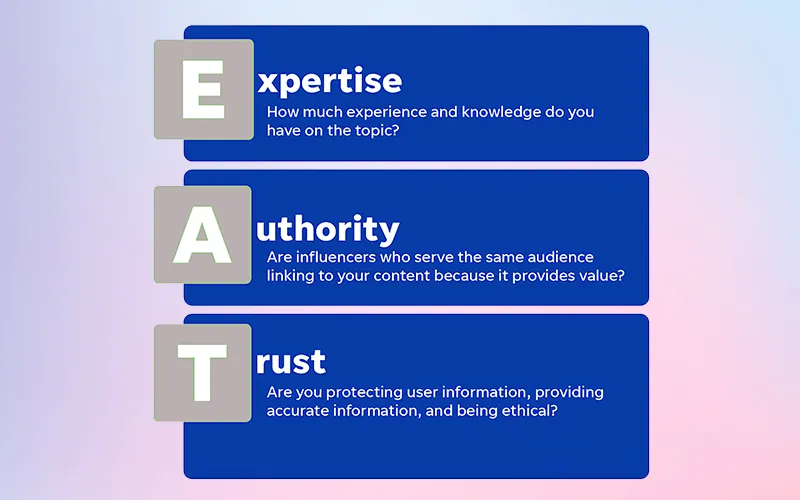EAT (expertise, authoritativeness, trustworthiness) - expertise, authority and trust. Three factors that Google uses to measure the degree of trust in a brand or website. Google wants to provide its search engine users with the best possible experience, so it only wants to promote websites that it fully trusts.

It is important to note here that the E-A-T concept is not an algorithm in the usual sense, nor is it a rating. It cannot be "quantified" and measured. Its essence is that the content must be created by an expert in the topic under consideration and meet high standards. And there can be many components of expertise.

What does EAT stand for?
This is an acronym for Expertise, Authoritativeness and Trustworthiness. That is, "expertise", "authority" and "reliability". In fact, these three words already describe the very principles of Google EAT SEO quite accurately when we talk about promoting a business on the Internet through content. If a company wants to become a leader in its niche and achieve high results, it needs to work with the E-A-T factors on a regular basis.
Google uses each of these three metrics to measure the experience, authority, or reliability of a website, the content of a single website page (based on URLs), and the content itself.
Let's take a closer look at each of the EAT indicators!
Expertise
It is very important for Google that content is created by experts in their field. Authors must have the relevant knowledge and education. Especially when it comes to such specific and important topics as medicine, security, insurance, finance, etc.
Remember that the days when you could hire any copywriter on a marketplace and order a dozen cheap texts with keywords are over. Today, content expertise is critical. And you have to pay for it, and sometimes very expensive.
Authoritativeness
Authoritativeness is another extremely important parameter. And you need to work on it constantly. For example, engage external specialists or engage in external optimisation (link building) of your website on platforms.
For example, to increase the authority of your website in the eyes of Google, you can interview a well-known expert in your niche. Or publish a guest article by an expert on your blog. Or place a link to your website on a reputable thematic resource.
Trustworthiness
Trustworthiness is the truthfulness, transparency, and accuracy of the content on a page. This indicator is extremely important for YMYL topics, which we will talk about later. But it is also important for any other topic. Therefore, it is necessary to publish only verified content, conduct fact-checking, and add links to sources of information.
In addition, even some "technical" issues affect the degree of reliability. For example, the availability of comprehensive contact information on the website, the name of the author of the article, etc. In most cases, the more data you provide, the better.
Where does E-A-T come from?
The EAT acronym comes from a set of publicly available guidelines published by Google. It is a set of publicly available principles for ensuring content quality.
Why is EAT so important for SEO?
It is actually difficult to answer this question unequivocally. Let's try to explain why.
On the one hand, ranking factors are something that can usually be measured accurately. For example, page load speed or bounce rate. But how do you measure expertise, authority, and reliability? Numerical indicators for these parameters simply do not exist.
On the other hand, Google still uses various signals to determine whether the content meets the EAT and how useful it is to the user.
How does Google measure E-A-T in this case?
Google trains the algorithm to look at these measurements and use them as signals to determine whether a company's domain or webpage should be trusted to meet user needs. If we fail to meet those needs, Google will choose someone else to do so.
Simply put, if Google finds that another domain or page provides a better customer experience than yours, it will promote them. This means loss of rankings, loss of traffic, and lost revenue.
Factors that influence the increase of E-A-T
Given that E-A-T is impossible to measure, it can be quite difficult to understand what specific factors influence these page metrics and how to improve them. But we can still give you a small checklist that will help you check the expertise of your content:
- the page contains materials that reveal narrow aspects of the topic under consideration;
- H1 headings and H2-H6 subheadings correspond to the declared field of knowledge;
- the text on the page is informative, without keyword stuffing and "no water";
- the article has a clear structure, labelled and numbered lists, graphs, tables, diagrams, headings of different levels, etc;
- sales pages have feedback forms, "breadcrumbs", search filters, etc.
EAT can be positively influenced by the indication of a reputable author, company contacts, links, and other elements that can increase the authority and level of trust both on the part of the user and search algorithms.
How to improve E-A-T?
So, let's move from theory to practice and consider how you can improve your Google EAT factors. We recommend that you focus on eight main steps. But there can actually be many more, depending on how comprehensive an approach you are willing to take.
1. Build external link mass
Although Google does not officially confirm that link mass affects SEO EAT, many experts say that a large number of mentions on authoritative resources has a positive effect on this parameter and thus affects the ranking of the site.
2. Keep your content up to date
There is no guarantee that the content that is relevant today will remain so in a month or a year. You need to update it, add new information, remove outdated information, etc. This is an important part of improving your Google SEO EAT score.
3. Check the facts
Fact-checking is a must! Fact-checking on resources trusted by Google has a positive effect on EAT indicators. For example, Wikipedia. In addition, citation sources can have a big impact. The more reliable and trustworthy they are, the better. That is, a quote from Wikipedia will be much more significant than an article from a random thematic website.
4. Collect more reviews
For Google, online reviews are an important element of a business's reputation. The main thing is that they should be sufficiently reliable and authoritative. It is worth clarifying here that positive reviews are important not only on your website. It is great if they are posted on many different platforms. This is a powerful signal to search algorithms that the site has a good reputation and the audience is as loyal to it as possible. At the same time, the effect of reviews for EAT largely depends on the platform on which they are published. For example, reviews on Tripadvisor or Google Maps have a positive effect on public establishments, while reviews on price comparison services and various aggregators have a positive effect on an online store, etc.
5. Show your merits
Many people underestimate the importance of the "About Us", "Our Team", "Company History", etc. pages. And for good reason! Google is quite good at analysing such information, which can subsequently have a positive impact on the ranking of a website and its position in the search results.
6. Share your contacts
It is quite logical that websites and pages without company contacts are less trusted by the average user than those with all this information. From the point of view of Google's EAT, this data is also very important.
You should not only provide reliable information about your website and the company as a whole, but also enable potential customers to find answers to their questions, consult and get additional information if necessary.
7. Create a Wikipedia page
In its guidelines for assessors, Google repeatedly mentions Wikipedia and confirms that it refers to this online encyclopaedia when researching reputation.
Having an article on Wikipedia can indeed have a positive effect. But it should be detailed, comprehensive, objective, and not an openly advertising text that cannot stand up to any criticism. Also, keep in mind that it is very difficult for an ordinary small brand to get a Wikipedia page. And sometimes it's even impossible. You have to be a truly reputable player in your industry, and you have to be mentioned by seriously reputable and independent sources. But it's worth a try anyway.
If you can't create a separate page, you can go the other way - get a mention on an existing Wikipedia page.
8. Get more mentions
Mentions of a company on external platforms (even without links) also have a positive effect on its reputation. They serve as a powerful EAT factor. Therefore, whenever possible, encourage users, authors, and experts in your field to mention you more often on various platforms.
Reviews, links, expert recommendations, news articles, etc. are important. Of course, the more reputable the resource where your company is mentioned, the better.
So, let's summarise all of the above!
EAT stands for expertise, authority, and trustworthiness, three factors that Google uses to measure the credibility of a company, brand, or website. It is very important for Google to provide its users with the best search results. Therefore, it is in its own interests to promote those web resources that it fully trusts.
Improving EAT parameters consists of two main parts:
- Honesty and openness. Hire specialists, share relevant and accurate information, take care of your customers, and affirm your values.
- Expertise and reliability. Publish only verified data, update it regularly, and fact-check even seemingly insignificant details.
